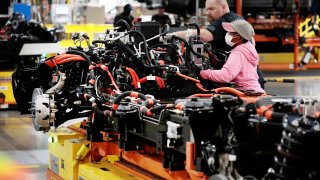
- An annual poll conducted by ESG research nonprofit Just Capital finds the American public citing workers as the most important issue for companies to get right.
- The support cuts across political party, race, age, income, gender and geography.
- The percentage of Americans citing workers as the most important issue has doubled in the past two years relative to other ESG priorities, far ahead of other high-profile ESG issues including climate and diversity, equity and inclusion.
A potential rail strike that was on the verge of upending the U.S. economy may have caught your attention in the headlines this week. It was averted on Thursday, but underlying the battle between rail carriers and labor unions over wages and quality of life policies for workers is an issue over which the American public is making its position increasingly clear: companies need to make their No. 1 focus treating workers right.
The percentage of Americans who say that workers are the most important issue for companies has reached 44%, up 5 percentage points year over year, according to an annual survey from ESG research firm Just Capital that was released on Thursday.
Get top local stories in Southern California delivered to you every morning. >Sign up for NBC LA's News Headlines newsletter.
Among specific worker issues, paying employees a fair and living wage (21%) is the priority most often cited. Four of the five worker issues that Just Capital tracks were among the top six priorities overall stated by Americans — protecting worker health and safety (7%); investing in workforce training (7%) being the others; and providing benefits and work-life balance (6%).
Even the No. 2 issue cited by Americans, creating jobs in the U.S. (11%), is in effect a worker issue (it is classified in Just Capital's methodology under "Communities".)
The focus on workers has doubled over the past two years relative to other ESG issues in the survey. Just Capital polls Americans each year as part of developing its methodology to rank companies on ESG performance (that annual study will next be released in January).
Money Report
In last year's rankings, the focus on workers led companies like Exxon Mobil to perform well, despite the amount of attention that climate change receives as an ESG metric. ESG can often be mistaken for being synonymous with climate — when Tesla was booted from an ESG index, the move attracted scrutiny, including from Elon Musk, who is no fan of ESG, stated in his usual blunt style, "I am increasingly convinced that corporate ESG is the Devil Incarnate."
In the new Just Capital survey, combatting climate change was cited by 2.6 percent of Americans in the survey's relative ranking of issues most important to the public, followed by creating a diverse, inclusive workplace (2.4%). It's important to note that the initial modeling to reach the 20 highest priority issue had already identified these two issues as being important.
Yet the findings on workers cut across every demographic in America: political party, race and ethnicity, age, gender, income and geography.
"We can say confidently the public is in agreement on this," said Martin Whittaker, founding CEO of Just Capital. "Companies should be looking to workers, how to prioritize them, how to engage with them, and paying a fair and living wage. That is clear and consistent."
It also matches other recent public polling showing widespread support from the American public on worker issues, including a Gallup poll on support for labor unions.

The focus from the public on workers is important as ESG has become a polarizing issue, leveraged by leading politicians to drive another wedge between Americans. In states including Texas and Florida, top state officials have inserted themselves into the ESG debate as part of the broader culture wars, with a particular markets' twist. They have taken punitive steps against ESG — which as investing practice seeks to hold companies accountable to environmental, social and governance performance tracked by a set of disclosures — by shutting out asset management firms which endorse ESG from bidding on state investment contracts and banning state investment funds from using ESG principles in investment decisions.
The market has responded as well, with the launch of investment funds designed to specifically be "anti-ESG" by name and style.
But if politicians and the new class of "un-woke" capitalists try to make an issue of ESG on the basis of the public expecting companies to improve treatment of workers, they might not find it as politically and rhetorically effective.
"How people are treated at work and how they get to participate in the creation of wealth, that's what people really want," Whittaker said. The ESG backlash tends to revolve around specific issues, whether it is climate change, gender and sexual identity or race issues. "What our polling shows is that in actual fact those are all issues-based conversations and you can agree or disagree, but there is a huge area where most reasonable people agree," Whittaker said. "Those who are trying to divide us might look to polling on this and think twice," he added.

Economic reasons for worker focus, led by inflation
The upending of the worker experience during the pandemic and the ways in which it compounded a labor market that was already experiencing long-term changes (less workers available due to demographic factors such as an aging population), have helped to put workers front and center as an issue.
Paying a fair and living wage ranking "far and away," Whittaker said, as the single-most-important issue, is no surprise at a time of labor market strength tilting to workers, and inflation which has pushed up both prices and wages — but the latter not by enough for real wage growth to outpace the rising prices.
"It's not just low-wage and hourly wage folks," Whittaker said about inflation's impact on the lives of Americans. "They are the hardest hit, but we also have millions of people, middle-class families experiencing real economic difficulties, and hardships affecting the majority of American workers."
The findings also come at time when more workers are worried that the leverage they have gained in the labor market may be threatened by an economy that is slowing and potentially heading into a recession. The Federal Reserve has said that its battle against inflation and interest rate increases (which after the latest CPI report this week may become even more aggressive) will lead to economic pain for Americans.
"Rising inflation is affecting many more workers than you think and now they are looking at the threat of job losses in a recession," Whittaker said. "That's the bigger picture here and for years we have had this stagnation of the working middle class in wages, and other worker-related engagement."
Companies treating workers right does not mean there won't be layoffs in a weaker economy. "The public is aware that layoffs and job losses and furloughs, they are all part of free market capitalism and no one is under any illusions," Whittaker said. But he added, "there are ways to handle layoffs that are just." And he said that long-term data shows companies which perform better on worker metrics perform better as publicly traded companies. He cautioned companies that given the labor market dynamics, "you can't just lay people off and rely on a vast labor market eager to come back to work. ... rehiring itself is not as straightforward as it was pre-pandemic and there's a cost to it."
A slowing economy is, in fact, a good time to put companies to the test on worker treatment. "One would hope companies would see the benefits of investing in workers and of what they can do for longer-term value creation," Whittaker said.






